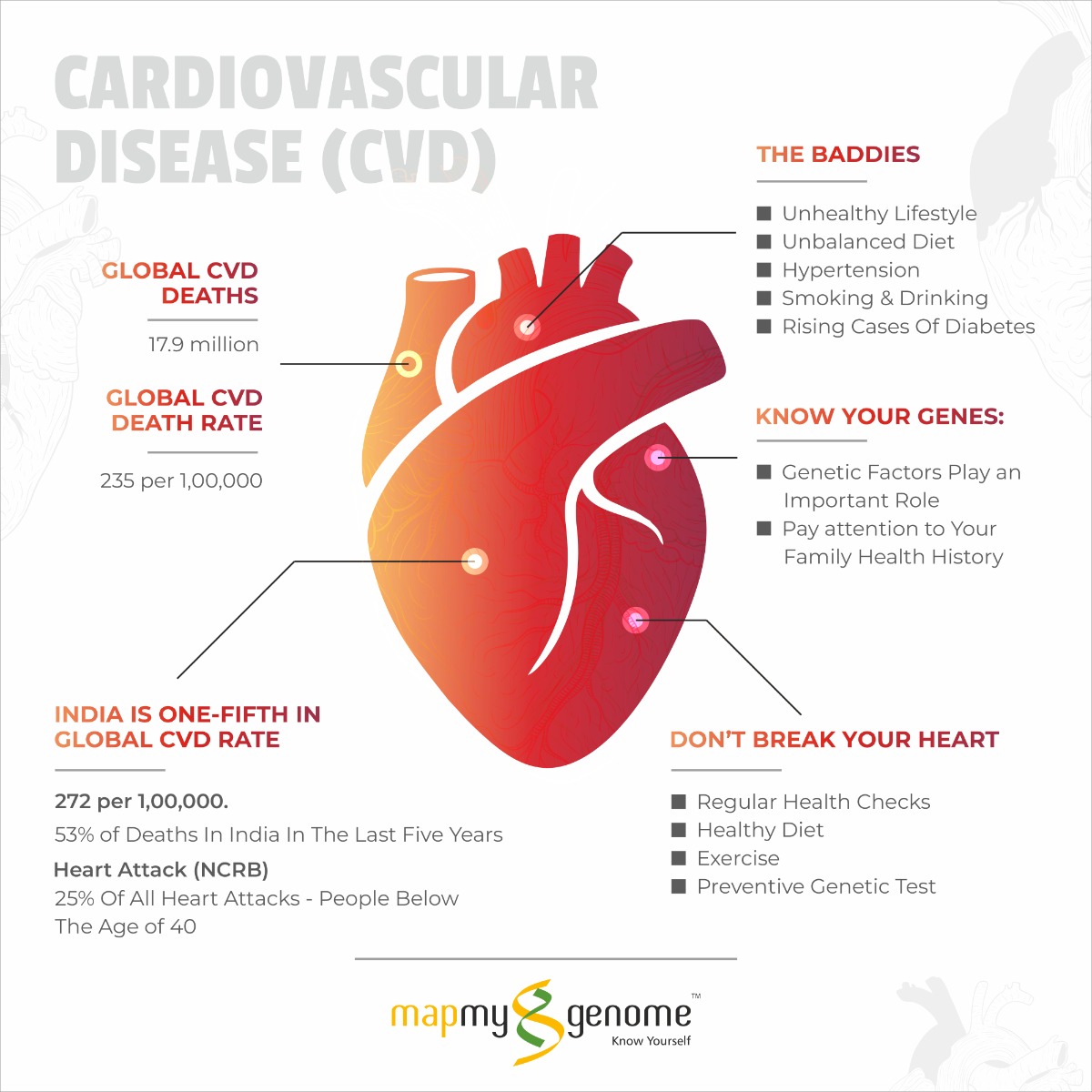Here’s why heart problems are rising among Indians
Apr 03, 2023
3280 Views
Former Miss Universe and Bollywood actor Sushmita Sen, shocked fans with an announcement that she had recently suffered a heart attack. This news sparked speculation about the root cause of rising cases of heart attacks, especially among the young and seemingly fit.
Recently an increasing number of headlines and viral videos have documented people across the country suddenly collapsing during everyday activities.
While lifestyle factors such as poor diet, lack of exercise, and smoking are known to increase the risk of heart disease, researchers have also identified several genetic risk factors that play a role in developing this condition.
Meet the ACE and APOE4
One of the most well-known genetic risk factors for heart disease is a variation in the gene that produces apolipoprotein E (APOE), a protein involved in the metabolism of cholesterol. People who inherit one or two copies of the APOE4 variant are at increased risk of developing high cholesterol levels. This lead to the buildup of fatty deposits in the arteries and an increased risk of heart disease. Note that, variation in APOE4 is also responsible for increased risk for Alzheimer’s.
Another genetic factor that has been linked to heart disease is a variation in the gene that produces the protein angiotensin-converting enzyme (ACE). This variation, known as the ACE insertion/deletion (I/D) polymorphism, has been associated with an increased risk of hypertension and heart disease in some populations.
In addition to these specific genetic variants, researchers have also identified a number of gene networks and pathways that are involved in the development of heart disease. These include genes related to inflammation, oxidative stress, and blood clotting, among others.
For example, studies have found that variations in the gene for the protein interleukin-6 (IL-6) are associated with an increased risk of heart disease. IL-6 is involved in the body‘s inflammatory response, and chronic inflammation contributes to the development of atherosclerosis or the buildup of plaque in the arteries.
Other genetic factors that have been linked to heart disease include variations in the genes for the proteins fibrinogen, factor VII, and factor XIII, which are involved in blood clotting. These variations can lead to an increased risk of blood clots, which can block the flow of blood to the heart and lead to a heart attack.
Quick facts
- India accounts for one-fifth of the global burden of heart disease.
- About 1.5 to 2 million heart attacks occur annually in India.
- The number of heart attacks in India is expected to rise to about 3 million by 2025.
- The prevalence of risk factors such as high blood pressure, high cholesterol, diabetes, smoking, obesity, and physical inactivity is high in India.
- Heart attacks occur at a younger age in India compared to western countries.
- The mortality rate due to heart attacks is also higher in India compared to other countries.
- Timely access to medical care can significantly improve the outcome of a heart attack.
- Lifestyle changes, including a healthy diet, regular exercise, and stress management, can help reduce the risk of heart attacks

How can your genes influence your heart health?
While genetic factors play a role in the development of heart disease, it is important to note that lifestyle factors such as diet and exercise also have a significant impact on an individual‘s risk of developing this condition. For example, a diet high in saturated and trans fats can increase cholesterol levels and promote the development of atherosclerosis. Regular exercise can help reduce the risk of heart disease by improving cardiovascular health and reducing inflammation.
Moreover, genetic testing can help identify individuals who may be at increased risk of heart disease due to their genetic makeup. This information can be used to develop personalized prevention and treatment strategies that take into account an individual‘s unique genetic profile.
For example, a person who has inherited the APOE4 variant may benefit from more frequent cholesterol screenings and a diet low in saturated and trans fats. In contrast, a person with the ACE I/D polymorphism may benefit from blood pressure monitoring and medications to manage hypertension.
In addition to personalized prevention and treatment strategies, genetic research is also leading to new therapies for heart disease. For example, drugs that target specific genetic pathways involved in the development of heart diseases, such as inflammation or blood clotting, are currently in development and may offer new treatment options in the future.
How MapmyGenome can help you?
Routine heart checkups include understanding your basic health history and assessing risk factors. The risk factor assessment entails checking your blood pressure, lipid profile, and HbA1c. Identifying genetic risk factors for cardiovascular diseases (CVD) and understanding your lifestyle habits such as your sleeping pattern, smoking or drinking habits, diet patterns, etc. through preventive genomic testing can help you make well-informed decisions about managing your heart health.
MapmyGenome’s preventive genomic tests such as Genomepatri and Cardiomap will give an insight into your genetic predisposition to a wide spectrum of CVDs, several associated risk factors, treatment options, etc. Plus, actionable recommendations from board-certified genetic counselors can help you make necessary lifestyle changes.
80% of premature deaths from heart attacks are preventable. Proactive management and prevention strategies are the best course of action to reduce the risk of heart disease.




